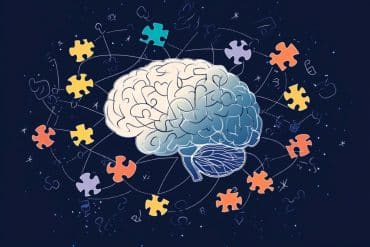Summary: Pigment-dispersing factor, a signalling protein that helps the brain keep track of time, also helps to regulate memory formation.
Source: SfN
Upsetting the brain’s timekeeping can cause cognitive impairments, like when jetlag makes you feel foggy and forgetful. These impairments may stem from disrupting a protein that aligns the brain’s time-keeping mechanism to the correct time of day, according to new research in fruit flies published in Journal of Neuroscience.
The brain contains ‘clock’ neurons that mold circadian behaviors and link them to cues from the environment, like light and seasonal changes. In fruit flies, the clock releases the peptide
Pigment-dispersing factor (PDF) to synchronize the activity of the clock neurons and drive time-based behaviors like mating and sleep. PDF may also underlie memory formation, explaining the cognitive dysfunction that occurs when the clock is desynchronized from the environment.
Flyer-Adams et al. tested how well fruit flies with a functioning core clock but lacking the PDF output signal could learn. Flies without PDF had severely impaired memory . However, memory regulation by PDF likely occurs without direct signaling to the main memory structure of flies.

These results suggest that PDF from the clock may promote normal memory throughout the day by acting as a timestamp to learning. The VIP pathway in humans may play a similar role.
About this memory research news
Source: SfN
Contact: Calli McMurray – SfN
Image: The image is credited to Flyer-Adams et al., JNeurosci 2020
Original Research: Closed access.
“Regulation of Olfactory Associative Memory by the Circadian Clock Output Signal Pigment dispersing Factor (PDF)” by Johanna G. Flyer-Adams, Emmanuel J. Rivera-Rodriguez, Junwei Yu, Jacob D. Mardovin, Martha L. Reed and Leslie C. Griffith. Journal of Neuroscience
Abstract
Regulation of Olfactory Associative Memory by the Circadian Clock Output Signal Pigment dispersing Factor (PDF)
Dissociation between the output of the circadian clock and external environmental cues is a major cause of human cognitive dysfunction. While the effects of ablation of the molecular clock on memory have been studied in many systems, little has been done to test the role of specific clock circuit output signals. To address this gap, we examined the effects of mutation of Pigment-dispersing factor (Pdf) and its receptor, Pdfr on associative memory in male and female Drosophila. Loss of PDF signaling significantly decreases the ability to form associative memory. Appetitive short-term memory (STM), which in wildtype is time-of-day (TOD)-independent, is decreased across the day by mutation of Pdf or Pdfr, but more substantially in the morning than in the evening. This defect is due to PDFR expression in adult neurons outside the core clock circuit and the mushroom body Kenyon cells. The acquisition of a TOD difference in mutants implies the existence of multiple oscillators that act to normalize memory formation across the day for appetitive processes. Interestingly, aversive STM requires PDF but not PDFR, suggesting that there are valence-specific pathways downstream of PDF that regulate memory formation. These data argue that the circadian clock uses circuit-specific and molecularly diverse output pathways to enhance the ability of animals to optimize responses to changing conditions.
SIGNIFICANCE STATEMENT
From humans to invertebrates, cognitive processes are influenced by organisms’ internal circadian clocks, the pace of which is linked to the solar cycle. Disruption of this link is increasingly common (e.g. jetlag, social jetlag disorders) and causes cognitive impairments that are costly and long-lasting. A detailed understanding of how the internal clock regulates cognition is critical for the development of therapeutic methods. Here, we show for the first time that olfactory associative memory in Drosophila requires signaling by Pigment-dispersing factor (PDF), a neuromodulatory signaling peptide produced only by circadian clock circuit neurons. We also find a novel role for the clock circuit in stabilizing appetitive sucrose/odor memory across the day.







